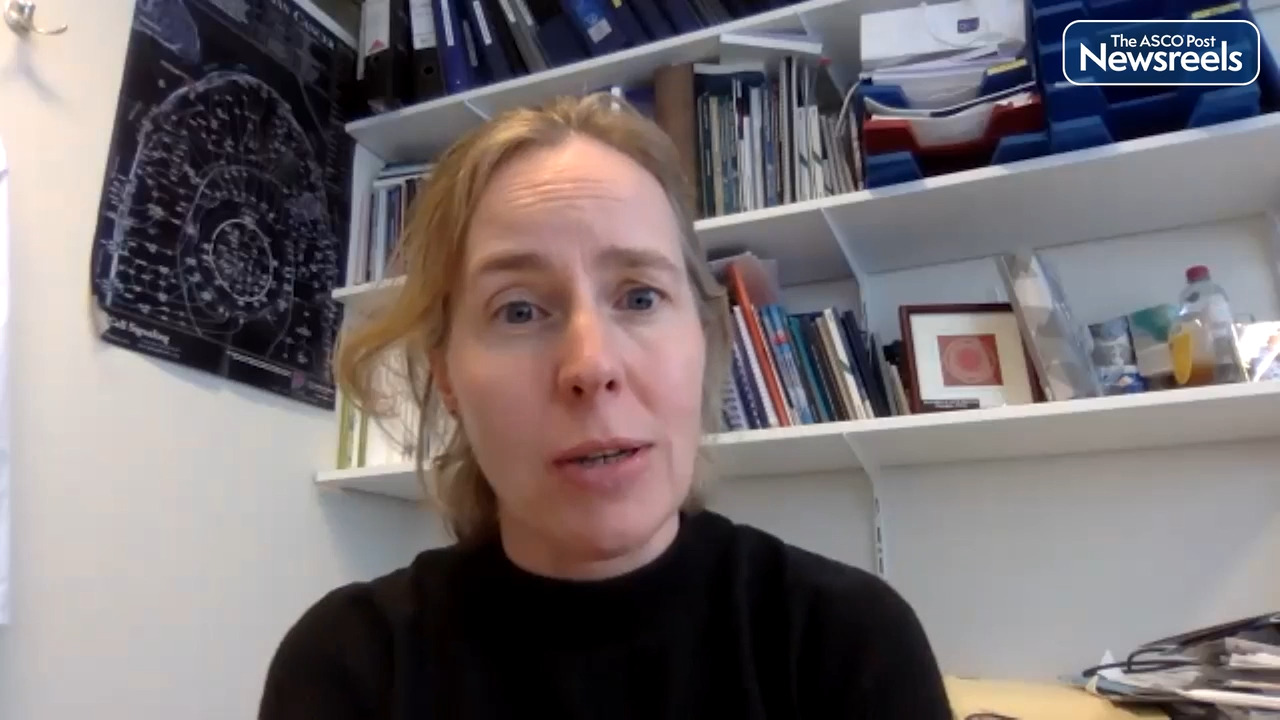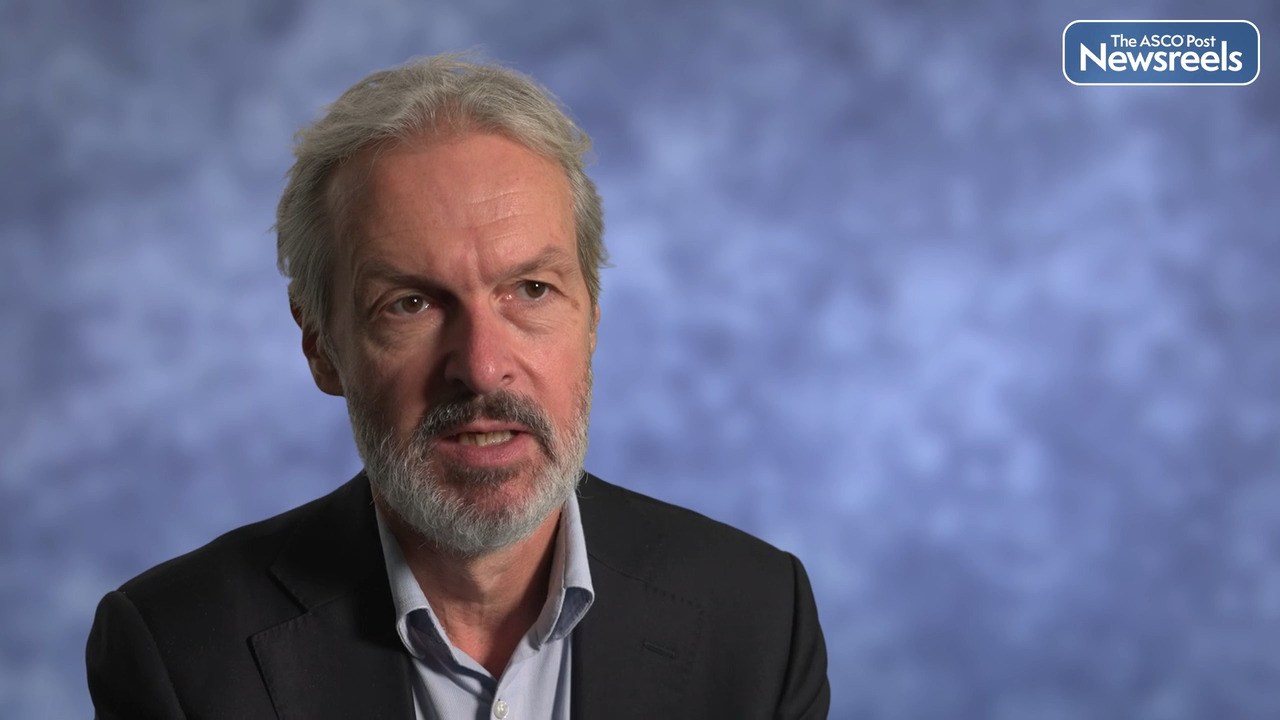Antonio Marra, MD, on Metastatic Breast Cancer: Patterns of Genomic Instability and Their Effect on Treatment
ESMO Congress 2022
Antonio Marra, MD, of Memorial Sloan Kettering Cancer Center, discusses a mutational signature analysis that reveals patterns of genomic instability linked to resistance to endocrine therapy with or without CDK4/6 inhibition in patients with estrogen receptor–positive/HER2-negative metastatic breast cancer (Abstract 210O).
Transcript
Disclaimer: This video transcript has not been proofread or edited and may contain errors.
The study we presented at this meeting was focused on the mutational signature analysis of breast cancers. We used the genomic data collected from a clinical sequencing program at Memorial Sloan Kettering, and we studied over 4,000 breast cancer, studying mutational signatures, that are mutational processes that shape the genomes of this cancer. In breast cancer, we have three main mutational processes and mutational signatures that are HRD, APOBEC, and clock. Our work will mainly focus on APOBEC and HRD that are the two main mutational signatures that cause genomic instability.
We firstly try to identify which are the main settings where these signatures are rich, and we find that both HRD and APOBEC are rich in the metastatic samples of the ER-positive HER2-negative subtype. We then evaluated the clinical and pathologic features of these tumors, and we found the enrichment for specific pattern including lobular phenotype and tumor with high tumor mutational burden.
From a treatment perspective, we then evaluated the role of the signature on the response to specific treatments and we found something really interesting, because these two signature were both associated with a lower progression-free survival for patient treated on first-line with endocrine therapy with or without CDK4/6 inhibitor, suggesting that genomic instability caused by these two mutation processes is associated with the reduced benefit from standard treatments.
We then focus the last part of our work on studying the genomic mechanism of APOBEC mutagenesis in breast cancer and we found some very strong genetic association including enrichment for variant-specific genes like CDH1, PIK3CA, and most importantly also, some genes are associated with endocrine-resistance like NF1 or PTEN.
We finally did a very strong analysis on the association within PIK3CA variants and APOBEC mutagenesis found a specific region in tumors that have multiple PIK3CA mutations and this may have some clinical indication considering that breast cancer with multiple PIK3CA mutations seems to have a better response to PIK3C-alpha-selective inhibition.
In conclusion, our study shows that genomic stability is a marker of lower benefit on endocrine therapy and CDK4/6 inhibition, and most importantly, we may have in the future new treatment targeting this mutational process that can open to advancement in treatments and open new opportunities for our patients.
Related Videos
The ASCO Post Staff
Jonathan E. Rosenberg, MD, of Memorial Sloan Kettering Cancer Center, discusses recent findings on the safety and antitumor activity of enfortumab vedotin-ejfv given intravenously as monotherapy or in combination with pembrolizumab to previously untreated cisplatin-ineligible patients with locally advanced or metastatic urothelial cancer (Abstract LBA73).
The ASCO Post Staff
Marleen Kok, MD, PhD, of The Netherlands Cancer Institute in Amsterdam, discusses the initial results from the BELLINI trial, which tested whether short-term preoperative nivolumab, either as monotherapy or in combination with low-dose doxorubicin or novel immunotherapy combinations, can induce immune activation in patients with early-stage triple-negative breast cancer with tumor-infiltrating lymphocytes (Abstract LBA13).
The ASCO Post Staff
Toni K. Choueiri, MD, of the Dana-Farber Cancer Institute, and Laurence Albiges, MD, PhD, of France’s Gustave Roussy Cancer Centre, discuss results from two important trials presented at ESMO 2022: Cohort 1 of the LITESPARK-003 study of belzutifan plus cabozantinib as first-line treatment of advanced renal cell carcinoma (RCC), and the KEYNOTE-B61 study of pembrolizumab plus lenvatinib as first-line treatment for non–clear cell RCC (Abstracts 1447O and 1448O).
The ASCO Post Staff
Matthew P. Goetz, MD, of Mayo Clinic, discusses recent data from the MONARCH 3 trial of patients with advanced hormone receptor–positive, HER2-negative breast cancer. The study, a second interim analysis, showed that longer overall survival was observed in both the intention-to-treat group as well as in the subgroup with visceral disease. However, neither met the threshold for statistical significance, and further analyses are planned when more data can be reported. (Abstract LBA15).
The ASCO Post Staff
Axel Bex, MD, PhD, of the Netherlands Cancer Institute, discusses phase III findings from the IMmotion010 study, which evaluated the efficacy and safety of atezolizumab vs placebo in patients with renal cell cancer who are at high risk of disease recurrence following nephrectomy (Abstract LBA66).





